September 15, 2021
![]() 42 mins Read
42 mins Read
We’ve revealed our pick of 100 unique stays across Australia and below you’ll find the 20 unique stays in NSW that made it into our coveted list. Head here to read the full list and start planning your next escape.
If there is one word to describe how a stay at Crown Towers Sydney (crownsydney.com.au) makes you feel, it is ‘pampered’. From the moment I arrive at 1 Barangaroo Avenue, I am blown away by the service I receive. The luxury hotel was billed as Sydney’s first six-star hotel and, while the rating doesn’t officially exist, everything about the $2.2 billion hotel makes it feel in a class of its own.
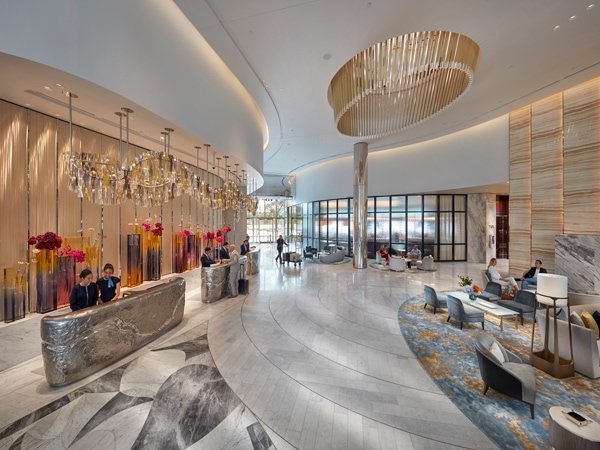
The remarkable Crown Towers lobby. (Image: George Apostolidis)
I can’t help but think the entryway to my 15th-floor Executive Harbour Bridge Suite is designed to build anticipation; the long hallway leads into the living area to reveal floor-to-ceiling windows with expansive views of the harbour. It invites you in and leads you on a treasure hunt of discovery through to the bedroom, with its impossibly comfortable king-size bed, and then on to the marble en suite with a deep, egg-shaped, freestanding bathtub and an enormous walk-in rain shower. I am not exaggerating when I say it is hard to pull myself away from the room to continue exploring the property.
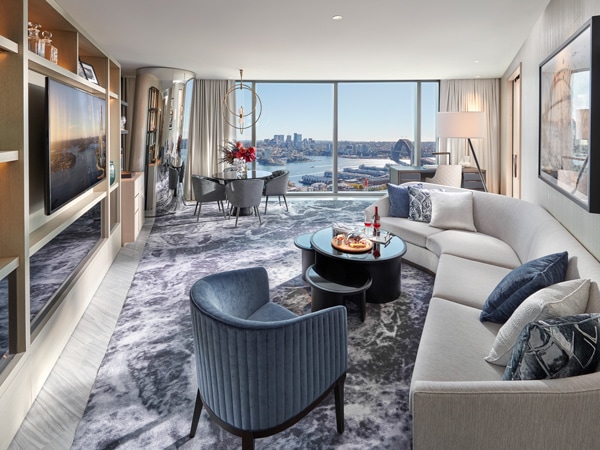
Take in beautiful Sydney from the Bridge Suite at Crown. (Image: Crown Hotels)
One of the most memorable perks of staying in this 275-metre-high hotel (officially the tallest in Sydney) is the views. It’s a surreal moment floating in the surely soon-to-be iconic heated infinity pool overlooking the harbour. Sydney truly is one of the most beautiful cities in the world and this is without a doubt one of the best vantage points to enjoy it from. I perch myself on one of the floating day beds and watch the sun slip lower in the sky as poolside attendants dutifully keep my drink topped up throughout my swim. I decide to round out the pampering experience with a massage at the Crown Spa Sydney.
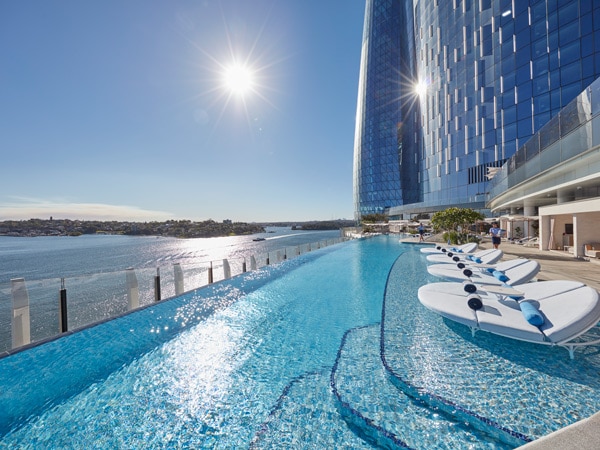
Soak up the sun in Crown’s pool. (Image: Crown Hotels)
The designer of the spa, Blainey North, has excelled in creating a dreamy, light-filled space that is as serene as it is pretty. The colour palette is a soothing combination of soft lilacs and candy-floss pink contrasted by marble tiles and brass gold and silver accents. The massage includes the use of the luxuriously decadent Aqua Retreat. I take my time jumping between the Infrared Saunas, Moroccan Steam Room, Experience Shower – which also delivers a water-pressure massage from all angles – and the 37°C-heated Vitality Pool. I emerge feeling like a new person and the post-holiday glow stays with me long after checkout. – Katie Carlin
Ok, let’s get this out of the way right from the beginning: I believe Emirates One&Only Wolgan Valley is one of the most amazing accommodation offerings not just in Australia, but in the entire world. I know, it’s a bold (some might even say audacious) statement but it is one I stand by wholeheartedly; if there was a T-shirt to that effect, I’d wear it. As a magazine editor for more years than I am willing to divulge, I have had the good fortune to stay at some unbelievably amazing places, and my belief remains unwavered.
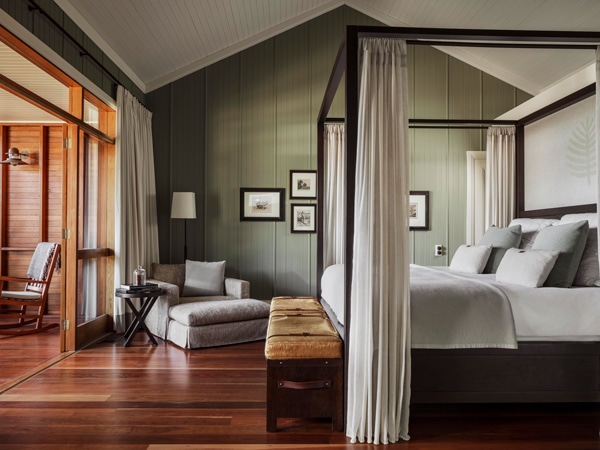
Enjoy the earthy tones of the Wolgan Valley Suite.
By way of explanation I can provide a long list of merits the resort boasts: its awe-inspiring location in a wide, secluded valley between Wollemi National Park and the Gardens of Stone National Park in the reater Blue Mountains (the drive in is an experience in itself), surrounded on all sides by soaring sandstone escarpments and thick bush; its world-leading eco credentials; its considered food offering, now helmed by executive chef James Viles (ex-Biota); and its quietly indulgent one-, two- and three-bedroom villas which come with considered inclusions from sketch pads and pencils tucked into drawers to mountain bikes at the front door to their own private seven-metre-long indoor/outdoor pools attached.
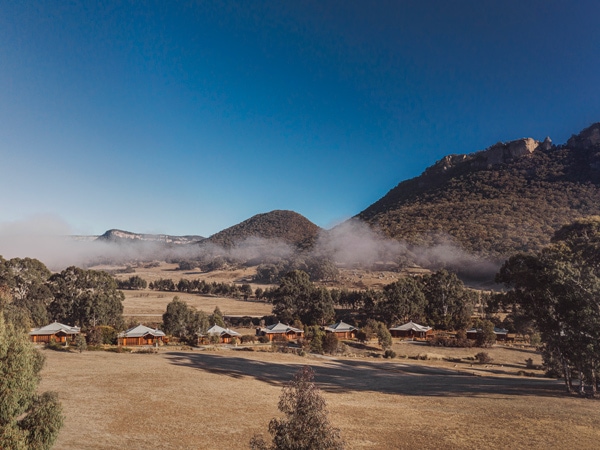
Aerial views of Wolgan Valley.
And while I love quality linens, sophisticated interiors, what-to-choose wine cellars and attentive staff – all of which I have sampled at Wolgan firsthand more than once – the true luxury here is actually in the simplicity of offering. The resort’s location, secreted away in its own hidden valley and occupying just one per cent of the 2800-hectare conservancy, and the privileged access it provides to the landscape, the wildlife and the history of the area are the benchmarks of its richness.
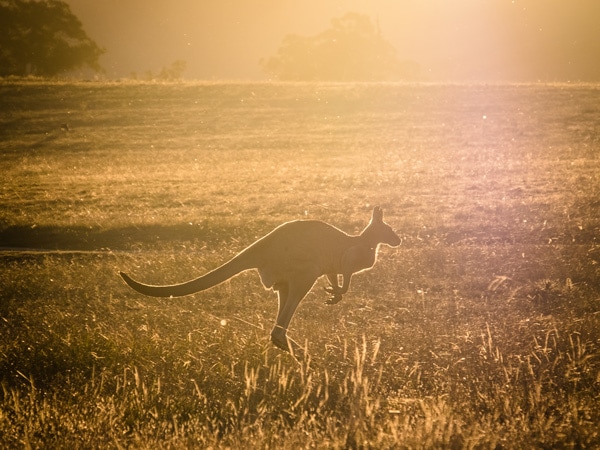
Golden hour at Wolgan Valley.
Waking in the morning as the golden light of sunrise starts to warm the low oatmeal and buff landscape to find mobs of kangaroos and wallabies grazing, unflustered by my presence. Sitting on a shaded viewing deck in the afternoon heat doing little more than looking out over the surrounding rock faces imagining the expanse of time nature and the elements have taken to carve such a wonder. Hearing about but never encroaching on the First Nations history that has played out here over thousands of years. Strolling back to my villa in the inky darkness under a starry sky surrounded by a silence I can almost touch Wolgan Valley a world-class ‘experience’ rather than just a stay.
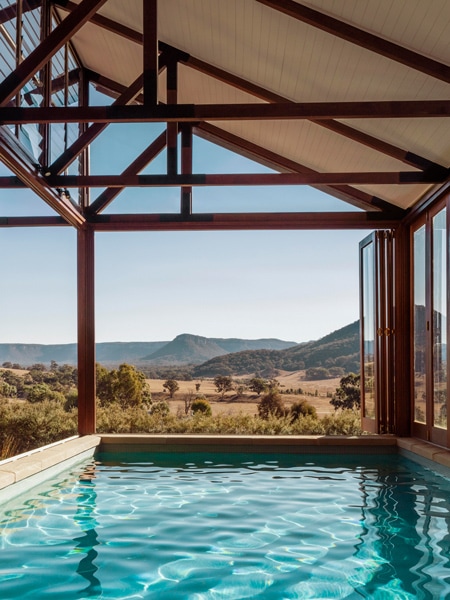
Cool off in the Villa pool.
When it comes to thinking, and more importantly, acting green, there are few places more entitled to boast about their bona fides than Emirates One&Only Wolgan Valley. The bar was set high from the beginning, when it became the first internationally accredited carbon-neutral resort in the world upon opening in 2009. Since then the exacting standards it sets
Have never been compromised. Every element of its day-to-day activities, and its ongoing presence in the valley, are measured in the good that can be done, from recycling and waste minimisation to energy and water conservation to revegetation and wildlife preservation. It also plays out in the subtle hearts- and-minds education of its guests, giving them the opportunity to take part in daily conservation work that will leave a lasting impression long after your visit here ends. – Leigh-Ann Pow
I must admit, I actually got slightly giddy upon first entering Halcyon House. My momentary swoon was brought on by a vintage brass reception bell sitting nonchalantly on a flea market-sourced table that constitutes the front desk there. You see, I have the heart of a collector (one of my friends prefers the word ‘hoarder’) and these first few elements – along with the bright-white retro exterior emblazoned with its distinctive royal blue logo – were an irresistible preview of what was to come.
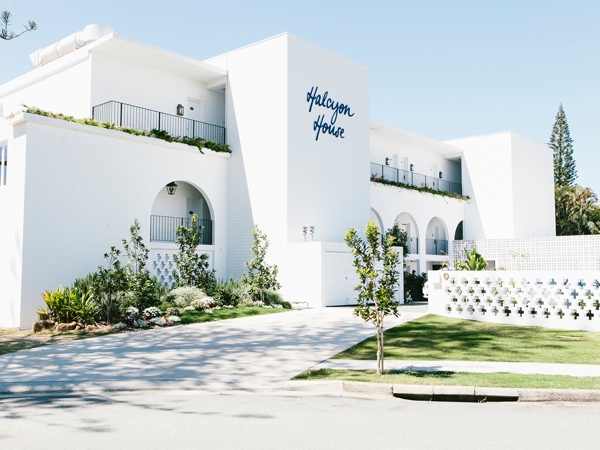
The beautifully simplistic exterior of Halcyon. (Image: Madleine Johnson)
Sitting at the edge of a deep sandy beach in the sleepy seaside town of Cabarita Beach on the NSW Far North Coast, Halcyon House created quite the fuss when it opened its doors back in 2015. The former mid-century surfing motel, a riot of Besser Blocks and brick, had been transformed by its owners, sisters Siobhan and Elisha Bickle, who purchased the property with vague plans to use it as a holiday home for their large combined family. But they very quickly devised a different plan: to create a bright and chic retreat the likes of which no regional town had ever really seen before.
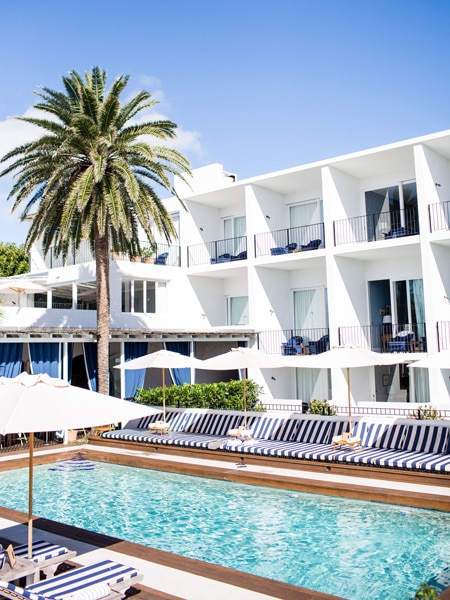
Relax by Halcyon’s pool. (Image: Kara Rosenlund)
Engaging the assistance of Brisbane-based designer Anna Spiro, the pair set about revitalising the tired old building, adding an additional floor, refocusing the outlook of the rooms and, most importantly, fitting it out in delightful vintage furniture, boldly patterned tiles, luxe upholstered walls, interesting vignettes and eclectic assemblages of artworks that have come to be known as ‘Halcyon hangs’. Add a general manager imported from Italy, a destination dining space, Paper Daisy, where the equally considered decor was as Instagrammed as the food, and it was an instant hit.
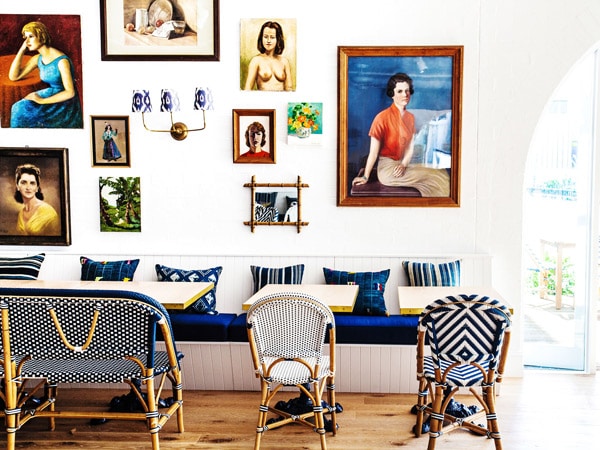
Enjoy the vibes at Paper Daisy. (Image: Kara Rosenlund)
During my time there, my initial delight was continuously surpassed by the details that make Halcyon House such a delicious experience. There is something to look at, and love, everywhere you turn, from the welcome treats and handwritten card upon entering your room to the tactile walls you want to constantly stroke to the beach bag tucked away in the wardrobe (illustrated by New York-based artist Wayne Pate), to the well-loved treasures sourced from the likes of Brimfield Antique Flea Markets in the US (my version of Disneyland) to the local staff who are small-town friendly amid the luxury. For me, the true success of Halcyon House, above and beyond the ‘I want it all’ design, including in the adjoining spa, is that it still possesses a sand-between-your-toes summer holiday vibe that saves it from feeling too perfect or contrived. And that’s definitely something to swoon about. – Leigh-Ann Pow
The early morning mist has settled on the Hawkesbury River like a soft blanket and the sun streaks through the trees to warm my skin as I sit on the deck of our peninsula tent sipping a steaming cup of tea. The nearby cackle of a kookaburra cuts through the silence and I hear a slow rustling in the bushes below, likely a goanna or bush turkey. It’s nearly been a full 24 hours since my partner and I arrived by boat to Marramarra Lodge and I am soaking up the stillness of the moment, willing it to last just a little longer as the hour of our departure inches closer.
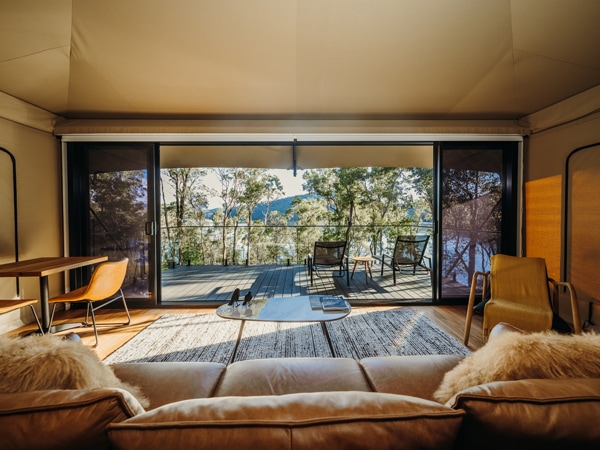
The view of the Hawkesbury River from inside the Peninsula Tents at Marramarra Lodge. (Image: Isaac Tseng)
Our glampsite, named Wirriga (meaning goanna in the language of the Dharug people), is not your traditional bell tent experience. With timber floorboards, a butter-soft leather lounge, dining area, oversized king bed, reverse cycle air conditioning and riverstone-walled bathroom, it feels more like an open-plan luxury lodge with the added bonus of canvas walls that unzip for ready-made access to the beauty of the surrounding bush. The adults-only retreat, which can only be accessed by boat, helicopter or seaplane, is located just over an hour from Sydney on Fishermans Point peninsula. The eight Peninsula Tents and six Hawkesbury Bungalows are nestled on the edge of Marramarra National Park and set over more than three hectares of land – the traditional land of the Dharug people, who have been the custodians of it for tens of thousands of years, long before European invasion. Both the peninsula and nearby Bar Island, which was once used as a meeting place between Dharug clans, are rich in Indigenous, early European and convict history.
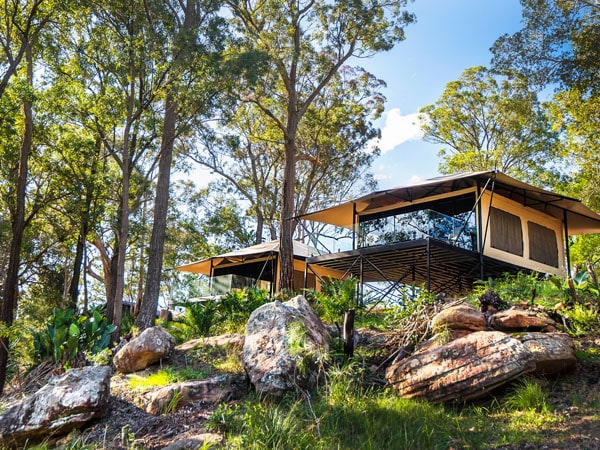
Glamping at Marramarra Lodge is not your traditional bell tent experience. (Image: Isaac Tseng)
During our arrival tour, we are pointed in the direction of a small cave on the edge of the river just beyond our deck. Inside, we find rock carvings and the remains of Aboriginal meals of periwinkles and oysters littered throughout the dirt; it offers a quiet and contemplative moment for reflection. The lodge’s dedicated team members express a deep respect and passion for Aboriginal traditions and culture – something that comes through in the way they care for and talk about Marramarra. The legacy of the Dharug people is woven into every facet of this place – from the names used to the food and experiences to the guiding operational principles that aim to preserve Marramarra’s unique origins and encourage the return of native wildlife.
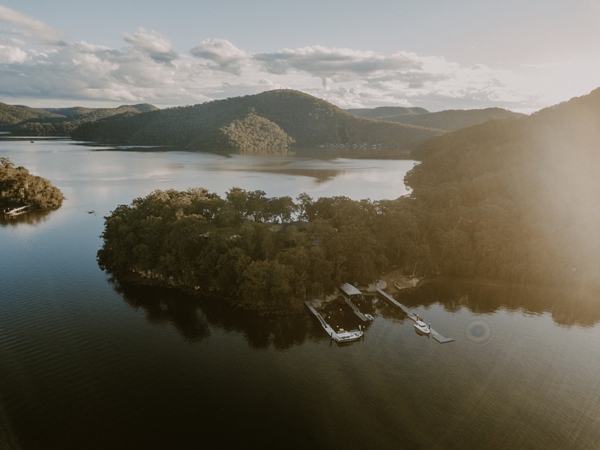
The legacy of the Dharug people is woven into every facet of a stay at Marramarra Lodge.
Just before the sun starts to set on our first day we make our way down the sandstone path to the river for an evening cruise along the Hawkesbury, complemented by oysters and sparkling wine. Our skipper points out historical sites along the riverbank as we soak up the mesmerising surroundings. The varied hues of blue of the river and sky, and on the slopes of the land on the horizon are interrupted with a dusty pink sunset that deepens to a vibrant orange as the boat slowly turns to make its way back to Marramarra for dinner.
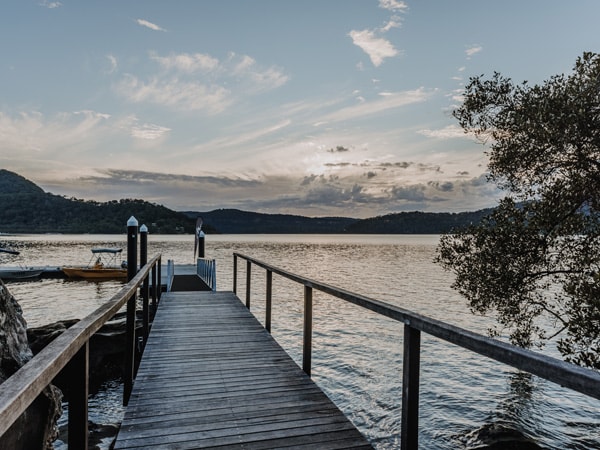
The sunset cruise departs from the picturesque Marramarra Jetty. (Image: Isaac Tseng)
Another unique aspect of Marramarra is its exclusivity. The all-inclusive stay caters to a maximum of 28 guests, which makes unwinding here alongside the river, immersed in nature, an intoxicating experience. But perhaps the most alluring aspect of all is the food and wine we are served at Budyari Restaurant. The five-course degustation features scampi, toothfish, duck, wagyu beef and a melt-in-your-mouth Basque cheesecake for dessert. Each course is perfectly paired with a mix of both local and international wines from the on-site cellar. With full stomachs, we sit around the outdoor fire pit and share stories of our day with another guest here on his babymoon. Marramarra is just the type of place you’d want to celebrate such a special occasion.
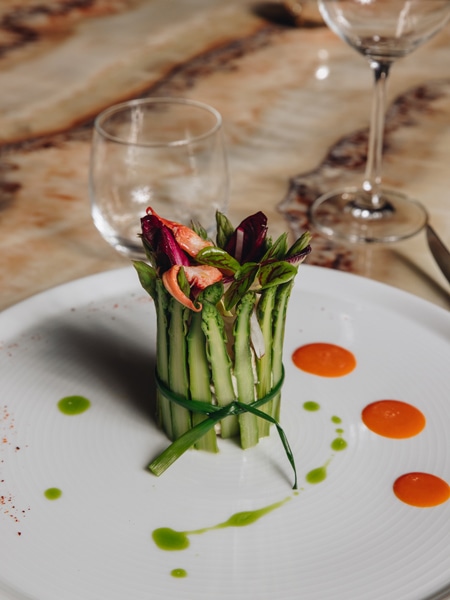
All food and wine at Budyari Restaurant is included in your stay at Marramarra Lodge.
Rain clouds roll in the next morning as we wait in the boatshed for our return transfer to Mooney Mooney. We missed the early yoga session that is held here by the water shortly after sunrise and now the hour I had tried to avoid arrives. As the boat pulls away from the jetty, the sky opens and rain falls hard and heavy. I look back as Marramarra Lodge grows smaller in the distance thinking that the rain should make it easier to leave, but strangely it only makes it harder. – Katie Carlin
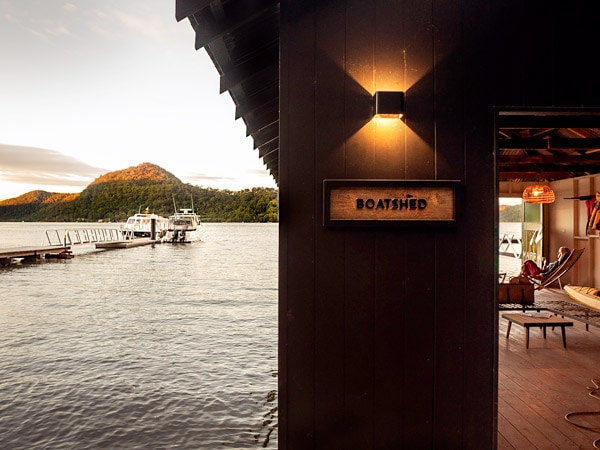
Soak up the serenity from the Boatshed at Marramarra Lodge. (Image: Torchlight Media)
The newest property from Spicers Retreats, Sangoma is the kind of intimately nature-bound hideaway where you might spend the day out on a private canyoning adventure before resting your well-worked muscles with a soak in a Philippe Starck bathtub overlooking the forest canopy. Located in a serene spot at the foothills of the Blue Mountains and blending equal parts luxury and eco cred, it promises pure escape from the everyday only an hour from Sydney.
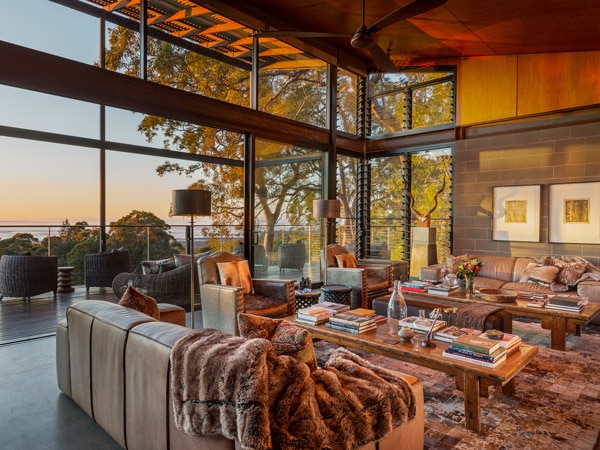
Sangoma is the newest property from Spicers Retreats. (Image: Hamilton Lund)
I awake in the middle of the night to a view of the inky-black sky filled with stars. The moon lights up the inside of my partially glass-walled eco hut on Kimo Estate and I see the embers are still aglow in the fireplace from earlier that night when I sat by its warmth with a tall glass of local Borambola Wines shiraz. I marvel at how much brighter the moon shines out herein the absence of all other light sources. I pull the sheets up higher, inch further down into bed and slowly drift back to sleep. This is just one of many memorable moments from my stay in JR’s Hut, one of three eco huts on the property (with more on the way), spaced kilometres apart for privacy and each with the added luxury of a wood-fired hot tub.
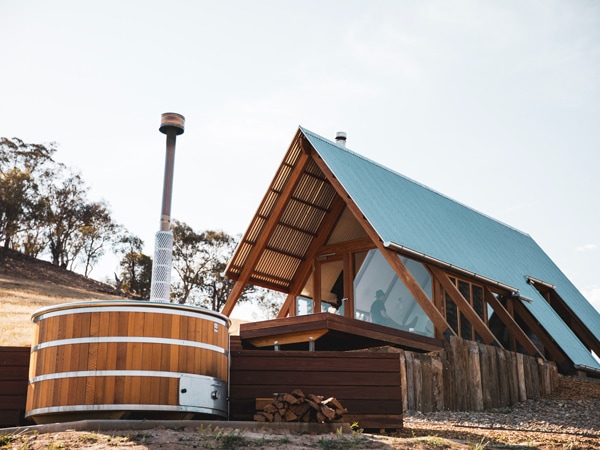
The beautiful architecture of JR’s Hut at Kimo Estate. (Image: Destination NSW)
The hut – which is far too modest a term to use for such a beautiful, architecturally designed timber structure – is pitched high on the hilltop of a vast working sheep and cattle farm located about a 3.5-hour drive from Sydney and 10 minutes from Gundagai. From the verandah I see the Murrumbidgee River snake its way through the patchwork of green-and yellow farmland below. Cockatoos take up residence in a nearby tree and the muffled bleats of sheep grazing below, which appear as fluffy dots from this distance, are carried on the wind. The 360-degree views are one of the eco hut’s best features, only rivalled by the simple, yet elegant interior offering. A queen-size bed is the focal point of the studio-like cabin with the aforementioned log fireplace off to the side and two chairs arranged to soak up the views, but it’s the rainfall shower that really takes centre stage. The glass wall gives the illusion of showering outside and I lather up the Leif body products under the steaming hot water as I take in the views of the farm below.
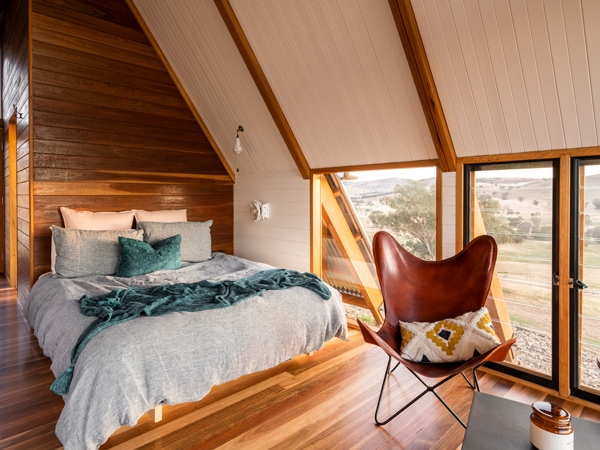
Wake up to the countryside at Kimo Estate. (Image: Matt Beaver)
A gourmet breakfast is included in my stay and I find homemade baked beans, farm-fresh eggs, local bacon, and cherry tomatoes soaked in balsamic dressing along with a loaf of fresh sourdough bread in the solar-powered fridge outside. I cook it up on the barbecue and camp stove provided, boil the kettle and wait for it to whistle to make tea and then dine al fresco. As I prepare to depart I notice my heart is as full as my stomach. This is exactly what my hurried heart needed. – Katie Carlin
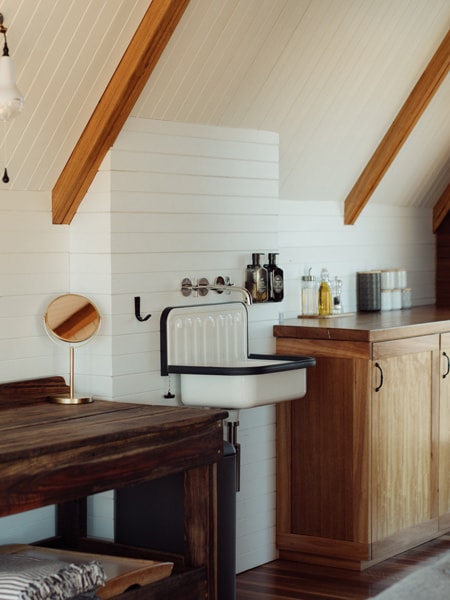
The lovely details of Kimo Estate. (Image: Matt Beaver)
Why are there only 11 biscuits in a packet of Tim Tams? It’s one of life’s great mysteries and I have plenty of time to contemplate it while sitting back and enjoying a Monte Carlo on my private, sweeping balcony at the William Arnott Hotel. A Monte Carlo biscuit that, might I add, comes from a sensibly sized packet of 12. A legitimate pantry staple, Arnott’s is an Australian cultural icon so you can bet your biscuits I was keen to stay at the William Arnott when it opened late last year. Oozing all kinds of charm, the three-suite hotel is housed in the Historic Arnott Bakehouse, located on Morpeth’s picturesque main street in greater Maitland. Built in the 1850s, it was an early baking site of biscuit royalty William and his brother David, and has recently been transformed into a nostalgia-filled stay.
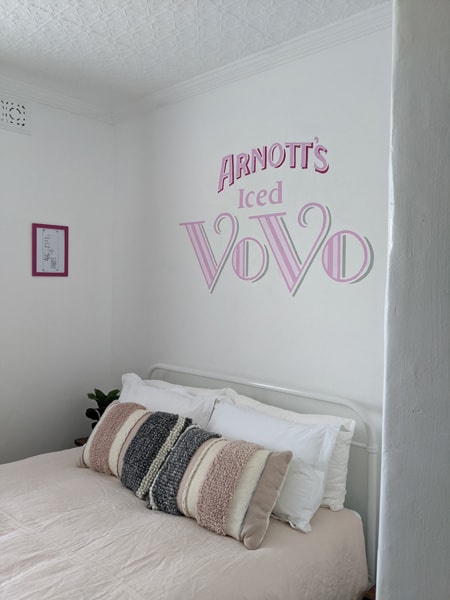
The Iced Vovo room at William Arnott Hotel.
I have the pleasure of occupying the Monte Carlo Penthouse, the premium option thanks largely to its size, classic palette and ornate features. The packet of Monte Carlos on arrival is a lovely touch, and I am two cream-filled biscuits down before you can say, ‘Pop the kettle on’. Downstairs, the VoVo Suite manages to stylishly honour its namesake with pink and maroon touches adorning the family-friendly space. The SAO Studio is small but sweet and, like the entire property, comprises tasteful (pun intended) nods to Bill’s eponymous biccies.
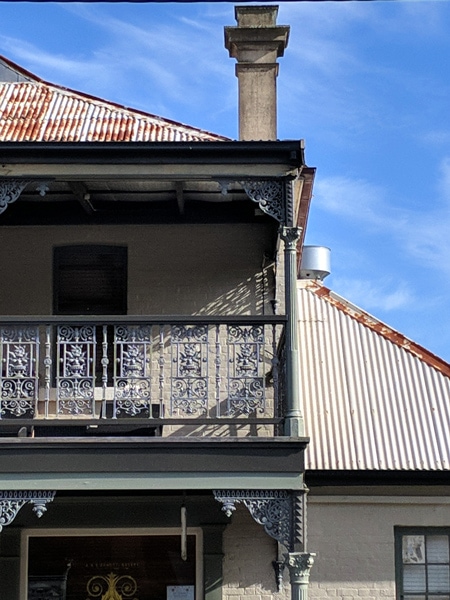
The William Arnott Hotel is full of character, outside and in.
What Stephen and Allison Arnott have created here mirrors what they were themselves seeking when they moved to the area almost 20 years ago: a considered retreat where connection reigns. Rather improbably, the then-Sydneysiders stumbled on the bakehouse while in Morpeth contemplating a tree change. The familial connection (Stephen is William’s great, great, great grandson) was too hard to resist. They asked the owner if he would consider selling and the rest is, quite literally, history. – Kate Symons
The sleek silhouette of the restaurant juxtaposes itself against the original red-brick buildings it adjoins. It’s built on the site of the old shearing shed and, with its cement sheeting, brass and leather design cues, takes inspiration from this agricultural heritage. I am a sucker for this kind of adaptive reuse in architecture and – before we even get to the menu showcasing regional produce, or in fact that stunning view over rolling New England paddocks – can see why Glasshouse Restaurant is a destination in itself. It’s just one of the highlights of a stay at Goonoo Goonoo Station: a place for long, slow lunches and even slower weekends.
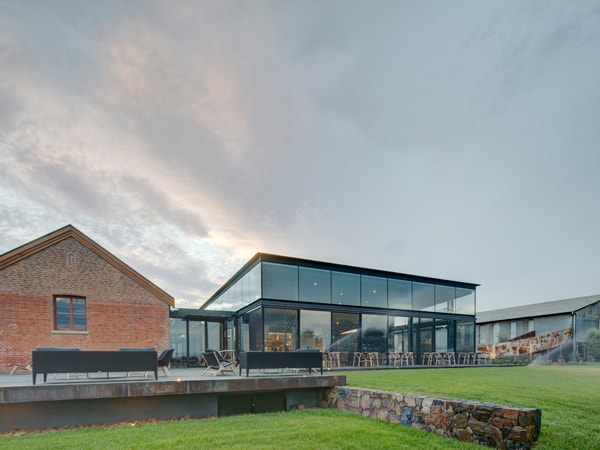
Enjoy a delicious feed at the on-site Glasshouse Restaurant. (Image: Goonoo Goonoo Station)
This beautifully restored 19th-century pastoral village, 20 minutes’ drive south of Tamworth, was once a self-sufficient cattle station and one of the most important in NSW. Established in 1841 and home to hundreds of families over the years, today it is a luxury accommodation offering with the aforementioned show-stopping restaurant on site. It’s still a working station, too, with more than 5000 hectares of cattle-grazing pasture. After dinner, it’s a short stroll back down the hill, passing heritage buildings like the chapel and old schoolhouse, to my digs in one of the freestanding cottages, which – with names like The Cook’s House, The Gardener’s Cottage and The Jackaroo’s – speak to the property’s history. All that’s left to do now is wind right down and enjoy the stillness of the countryside from my own private verandah. – Imogen Eveson.
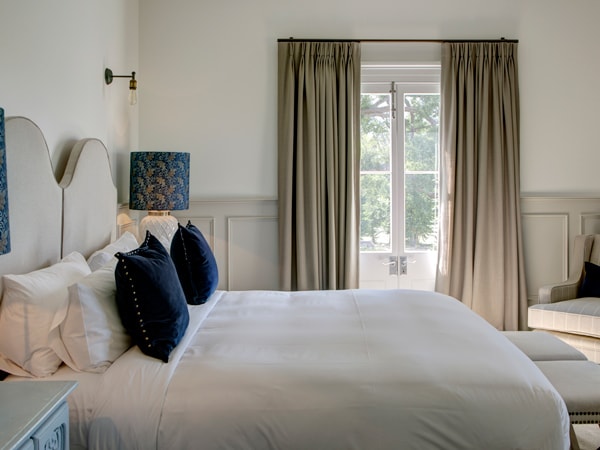
Soak in the stillness of the country at Goonoo Goonoo Station. (Image: Goonoo Goonoo Station)
Armidale’s debonair Tattersalls Hotel is perhaps the most underrated time warp in all of country-town Australia. The Victorian-era gold-rush hotel received its first Art Deco makeover back in the 1930s, but a 2019 refurb by Sydney-based interior design studio Luchetti Krelle is next-level artisanship. The tight detail in every room and public space of the three-storey building, from exquisite geometric rugs to top-shelf parquetry, is an Arts Décoratifs eye-bath.
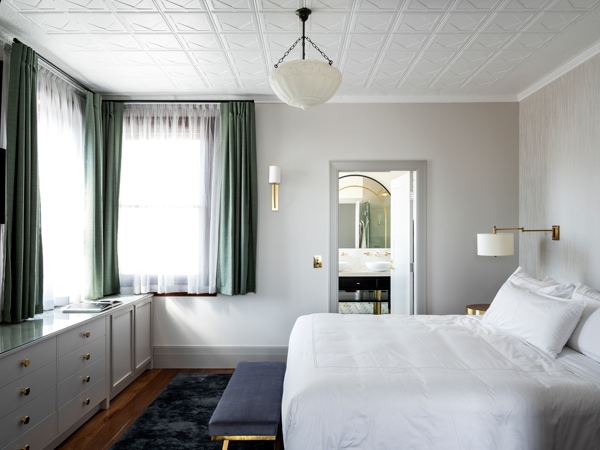
The modern interior of the Chancellors suite.
Featuring deep, soft bespoke furnishings, graceful drapery, subtle metallic highlights and French-washed walls, the Chancellor’s and Governor’s Suites are refined chambers of retrospective excellence. The ground-floor restaurant (headed by chef Jean-Luc Morcellet) is a natural centrepiece and gathering place, its modern-classic food and cocktails making it one of New England’s culinary highlights. – Steve Madgwick
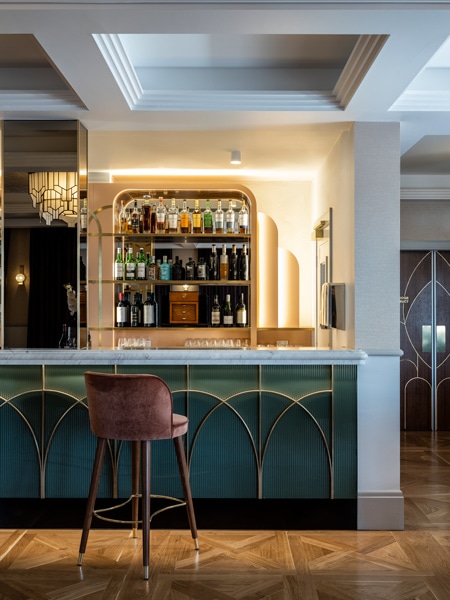
Enjoy a drink at Tattersalls Bar.
From the moment I ‘tie up’ my 4WD next to the log cabin on the lake, 20 minutes from Jindabyne, I feel as though I’ve entered a parallel universe. A gaggle of chooks and a border collie rush out to greet me, and a rocking chair snuggles up one end of the verandah. Suddenly I am The Woman from Snowy River, and I am home. It’s a clever place that manages to merge authentic pioneer style with luxury but the Lake Hut does it.
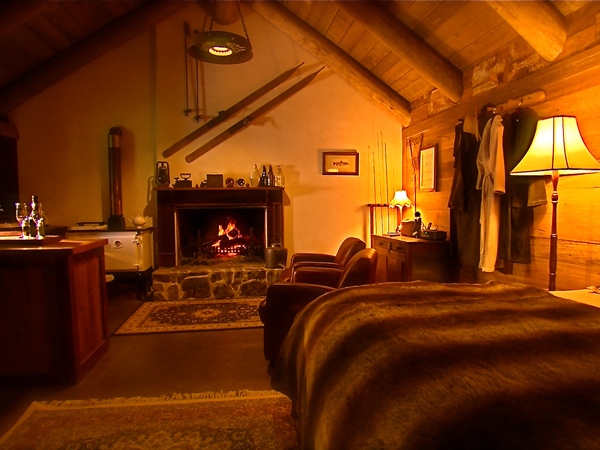
Escape the Snowy Mountains cold at the Moonbah River Hut.
Beyond the rustic wooden door (there are even tiny gaps at the bottom of it) are wood and stone walls, hessian sack curtains and a wood-fired cooking stove. A homely kitchen dresser contains genuinely old crockery and bone-handled cutlery. But it’s also a place with a deeply cosy bed with electric blanket, luxury sheets and faux-fur throws, and the huge stone fireplace keeps the polished concrete floor releasing heat all night long. It’s charming in the extreme and with a corrugated iron-lined en suite, there’s no running to the outhouse at 2am. To say it transports you to another place and time is an understatement.
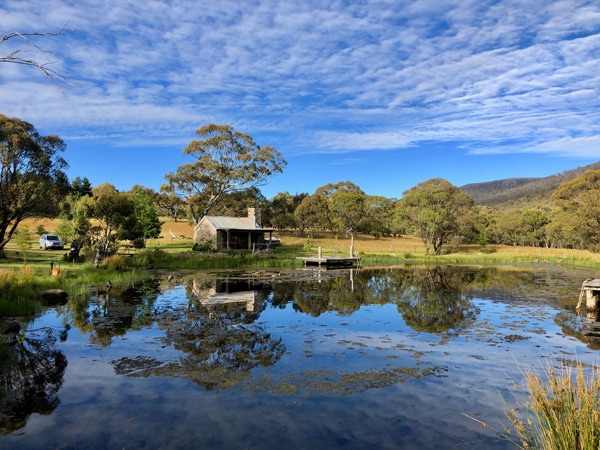
Retreat and breathe in the fresh air at Moonbah. (Image: Laura Waters)
Moonbah Huts is somewhere to hole up with a loved one, explore the Snowy Mountains, or just kick back on the verandah and read a book. The fly-fishing in the Moonbah River, a few minutes’ walk away, is world-class, but the private trout-filled lake on my doorstep is where I have my first try at casting. Owner and fishing expert Brett Smith reckons they ‘always’ catch a fish during a two-hour lesson. I don’t even get a bite but with so much serenity around me it doesn’t matter one bit. – Laura Waters
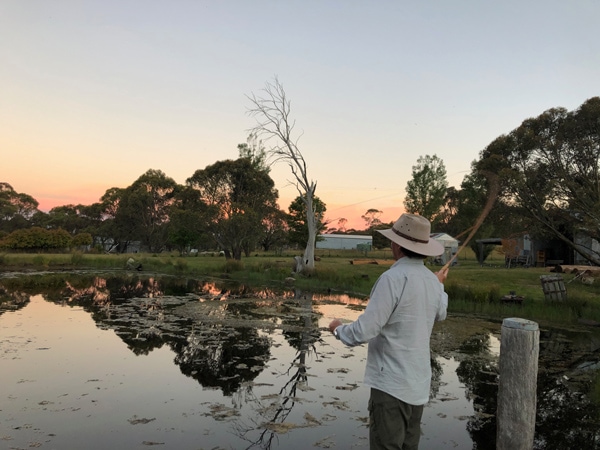
Moonbah is on a world renowned fishing spot. (Image: Laura Waters)
Could this 109-year-old stone structure be the most wonderfully surprising stay in a place already full of surprises? Broken Hill is a quintessential outback town suffused with silver, lead and zinc-mining history and layered with a dynamic art scene and movie mythology set against a sprawling desert landscape. And the fact that its most luxurious accommodation is a Romanesque-style church adds another layer of intrigue again. This heritage-listed building has undergone a sympathetic restoration on the outside and a pick-your-jaw-off- the-floor transformation on the inside. Is that an antique altar fashioned into an island in the gourmet marble kitchen? Yes it is. Original pressed-metal ceilings soaring almost seven metres in height, and a dining table grandly set under the twinkle of a crystal chandelier? Indeed.
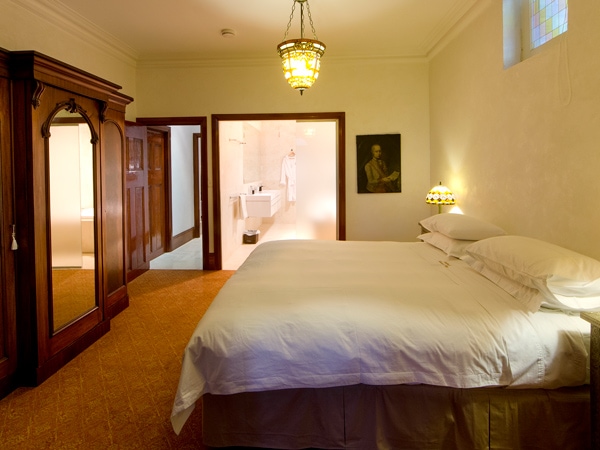
Stay at the historic Broken Hill Outback Church Stay. (Image: Boris Hlavica)
Broken Hill Outback Church Stay combines an eclectic mix of antique furnishings with all mod cons to create a totally unique proposition. Its three master suites each come with king-sized beds wrapped in quality linens and their own en suites – lined floor to ceiling in limestone tiles no less. A further 200 square metres of polished limestone floors add to the distinctive atmosphere. Groups of 12 guests can be accommodated across this space, including on the mezzanine level – propped up by antique timber columns – and in further accommodation in the associated Presbytery and Cottage, as well as those travelling solo, in couples or in smaller groups (pay for the suite you need with exclusive access to this incredible property). All this, plus you’re just a minute’s walk from more Broken Hill history by way of Bells Milk Bar, Australia’s oldest continuously running milk bar.
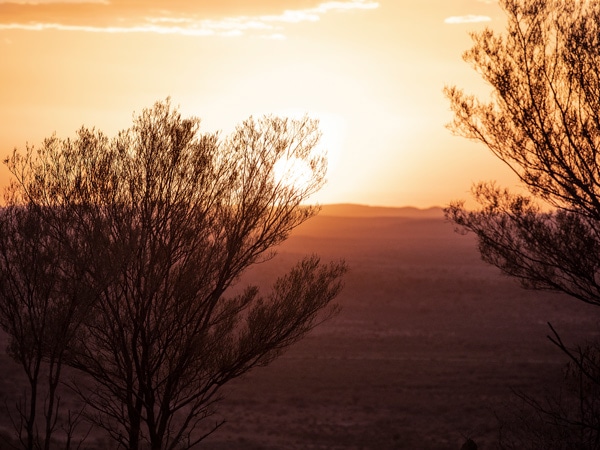
Experience the true Aussie outback at Broken Hill. (Image: Destination NSW)
The funny thing about ‘authentic’ accommodation back stories is the louder you have to shout them, the less genuine they probably are. The Murray family, owners of 130,000 hectare Trilby Station in north-west NSW, don’t have the time nor need to scream their sixth-generation farming credentials from the rooftops. It would be a pointless exercise in any case, given the closest neighbours are 15 kilometres away. Trilby was a true out-before-dawn, home-after-dusk sheep farm long before it diversified into becoming one of Australia’s first station stays. “We only take a day off if it rains, and only because you can’t drive anywhere,” says Liz Murray. “Even then, you’re usually in the workshop or doing something.”
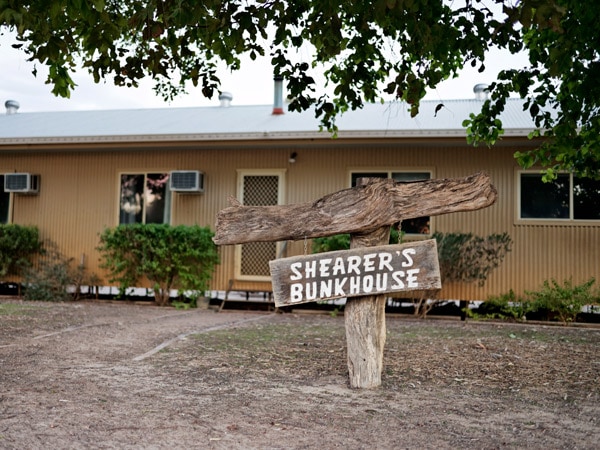
The Shearer’s Bunkhouse at Trilby Station. (Image: Destination NSW)
Four decades ago, then-newlyweds Liz and Gary moved onto this shimmering, mesmerisingly flat mega-property; its outback credentials unquestionable. Trilby literally passes the Ogilvien ‘Back O’ Bourke test’ – it’s 125 unsealed kilometres south-west across the black-soil plains from the town. The station has only relatively recently been gifted an “actual” address (10,965 Toorale Road), but Liz suggests you don’t type it into your GPS. Digital navigation has led a few guests “up the garden path”. From the Bourke-side (heading along the 950-kilometre Darling River Run), the weensy village of Louth is the nearest settlement. Trilby’s stilted mailbox is a storytelling landmark in itself; its corrugated-metal roof tilts dashingly, as if tipping its hat hello and directing you up the main-road-like driveway.
It’s been a receptacle of good and bad news since the 404,685-hectare Dunlop Station was carved up among the Murray family in the 1950s (thus creating Trilby). Peeling paint still reveals the 1976 flood-level – “the highest in white man’s history”. Liz takes charge of “anything inside the levy banks” while Gary and two of their four children, Tom and Will, look after “the rest”. This includes mustering 14,500 merino sheep – by plane (Gary’s ‘sky Toyota’) and motorbike – around a space a little less than twice the size of Singapore. Farming a patch of semi-arid outback where “you expect more dry times than good seasons” has made the Murrays paragons of bush pragmatism.
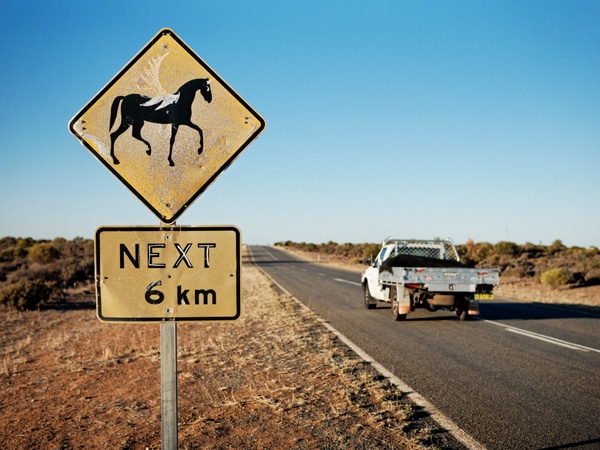
Country roads en route to Trilby Station. (Image: Destination NSW)
With cyclical drought a reality, they supplement their main income by rounding up trips of drought-resistant wild goats that roam the wide-open spaces. Some seasons they get more for a big billy goat than they do for a prized lamb. “When the kids were little, every time we needed to pay school fees, a power bill, or I wanted a hiking holiday [her big passion], we went and chased goats,” says Liz. While Trilby is certainly not a City-Slickers-style hands-on dude ranch, there are plenty of opportunities to witness the action, especially around shearing time (May).
The self-drive ‘mud-map’ tours, however, are the most glorious way to get lost, while not getting lost, in Trilby’s immense space. Ninety kilometres of trails thread through a landscape that is equally bewitching bone-dry or fiesta-ed in wildflowers. The land has been worked since paddle-steamer days so something always beckons you over for a gander; be it a sun-bleached animal skull staring up from the cracked earth or an old Holden carcass confusing your calendar. Out here, Trilby’s big sky soon becomes your mood.
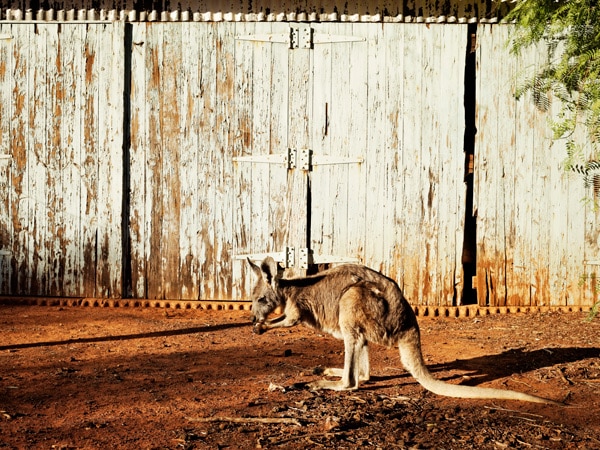
Experience plenty of Australian wildlife at Trilby Station. (Image: Destination NSW)
In exactly the “middle of nowhere” you’ll bump into Gary’s parents’ 1950s “honeymoon house”, petrified in time from when it was abandoned. Eerily quiet except for the sinister banging of screen doors, it has horror-film set written all over it. Nearby, a vintage double-decker bus rusts silently, a sad sight once you learn about its formerly adventuresome existence. For all Trilby’s uninterrupted horizons, most human and wildlife activity contracts to within cooee of the Darling. When the river flows, so do the recreation possibilities, from canoeing and birdwatching to yabbying and fishing.
The farm-stay options are set among river gums and coolabah trees, relatively clustered around the Murrays’ homestead and its treasure-filled “rust-gardens”. Grey-nomad and family-friendly campsites spread out along the riverbank. Refurbs of the Overseer’s Cottage and Jillaroo’s Cottage deliberately shied away from “modernising” the former workers’ quarters. These self-contained cottages feel more house than hotel: sprinkled with local curiosities, black-and-white-framed history and a sturdy fridge your grandparents would have given their right arms for. No more or less than you would expect in the Murrays’ homestead.
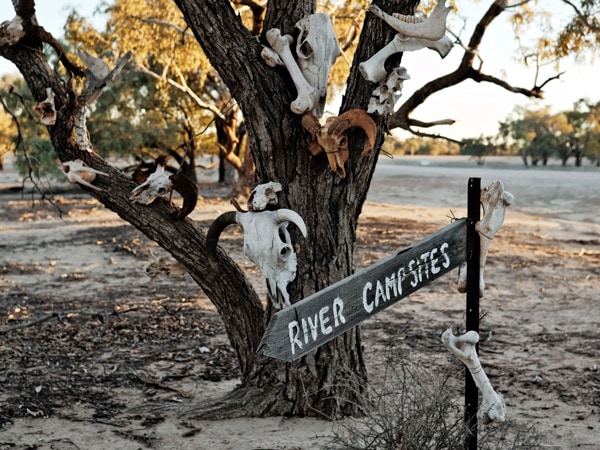
Sign to the river campsites at Trilby Station. (Image: Destination NSW)
The cute new kid on Trilby’s accommodation block is corrugated one-bedder Mitch’s Hut. The generous north-facing verandah, complete with Weber and fire pit, is a sensational sunset perch. Liz’s home-cooked cuisine is a treat several generations in the making. Think full-cream, no-compromise country classics such as slow-cooked lamb shanks, stockyard chicken pie – just like Nanna made it – and dense sticky-date pudding for afters. Trilby’s farmyard breakfasts and two/ three-course dinner packages aren’t cheap, but fairly priced, given their quality and day-in-the-fields-sized portions plus the fact that the local shop is, well, there isn’t one. Officially it’s BYO, but a bottle of medium-priced wine can always be rustled up.
On a station of such big numbers, you wonder how Liz manages to cater, on top of everything else. “They used to ask me if I milked cows for my fresh milk,” she says. “I said, jokingly, does it look like I’ve got time to milk a @*&%$#* cow [bursts into laughter]?” And that’s the flavour of authenticity you get at Trilby. Real people. Real hospitality. Real connection to life on the land. Which is why such a mind-bendingly large space can feel like such a small personal one.
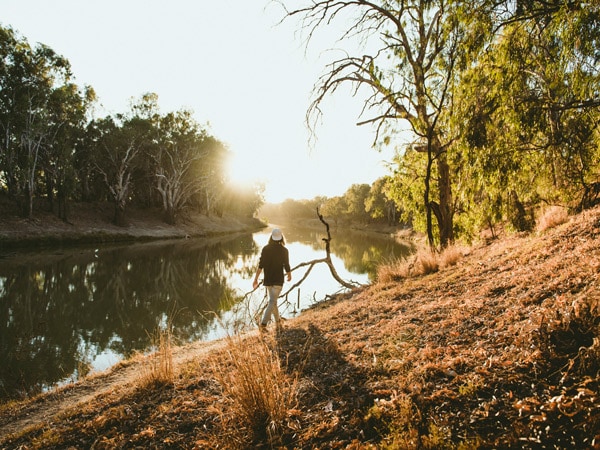
The glistening Bourke River. (Image: Destination NSW)
Corynnia Station: The accommodation on this merino and cropping property at Carrathool via Hay is charmingly decked out with vintage furniture and chintz.
Eldee Station: This eco- credentialled working sheep and cattle farm is 25 kilometres from Broken Hill; book the comfy Grae Suite.
Carinya Station: The camping on this Lightning Ridge property is no frills, but the insights into the workings on an outback farm are authentic and plentiful.
Callubri Station: Constructed from upcycled shipping containers, the Sky Suites on this 11,300-hectare working sheep property in the NSW Central West add a touch of modern luxury to the station experience, including a mineral plunge pool. – Steve Madgwick
Sweet relief. That’s the only way to describe the feeling one gets walking through the doors of this quirky property built underground to escape the scorching outback heat. Outside in White Cliffs, a commercial opal field some 255 kilometres north-east of Broken Hill, we’ve spent our afternoon fossicking in 45°C+ heat, but inside this rabbit warren of 30 womb-like rooms – each one a pleasant 22°C – we embrace the cooler side of outback life. Cue beers in the outdoor pool, movies under the stars and in house meals in the dining room. The best part? Falling asleep content in the knowledge we’ll probably never experience anything quite like this again. – Dilvin Yasa
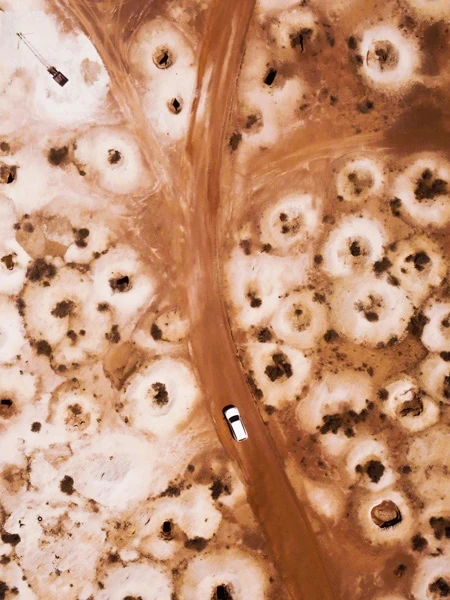
The beautiful landscape White Cliff is located on. (Image: Destination NSW)
While the dark good looks of Dovecote have made it a favourite with design enthusiasts, its practical appeals tick the box with doting parents (who are also design enthusiasts), extended families, and the family you choose too. The contemporary farmhouse, perched on 60 hectares of oceanfront farmland in the Kiama area of the NSW South Coast, caters to all comers – and it does it in serious style.
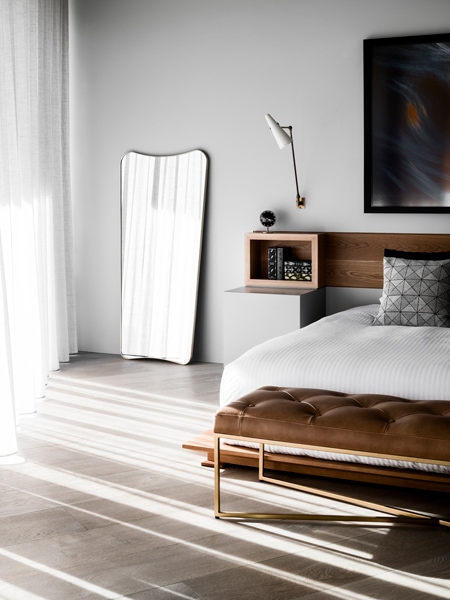
Dovecote’s luxurious bedrooms. (Image: Tom Blanchard and Kate Ballis)
The metal spine of the four-bedroom, four-bathroom main house rises up and reaches out over the land with extruded fingers clad in standing seam black aluminium cladding that principal architect Andy Carson, of Atelier Andy Carson, found “so remarkable we imported it from Germany”. Andy says Dovecote is highly attuned to the user experience and framing very specific views. “One of the principles we employed was that the form should react to and respond directly to its surrounds and every inch of the design is in response to the immediate and greater landscape. The building twists and morphs toward specific views, forging a greater connection with the landscape, which is in constant change with waves, tides, whales, dolphins and passing ships all asserting themselves,” he says. “The owners had a very clear vision of what they wanted Dovecote to be and then let me respond to it in terms of how to react to the site, the need for wind protection and balancing privacy while capitalising on those expansive views,” he says.
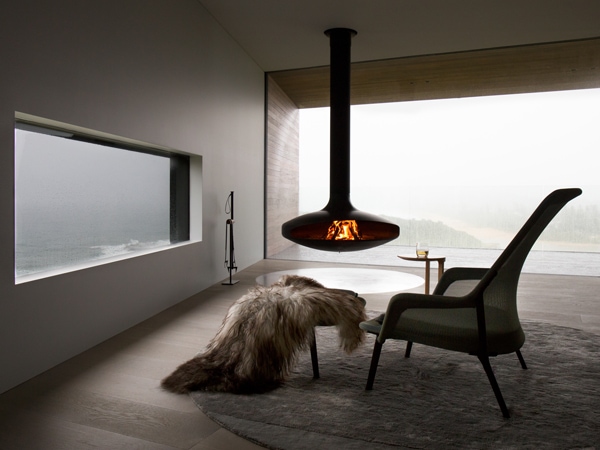
Escape the South Coast winter chill and snuggle up by the fireplace. (Image: Kathryn Durnham)
The strong horizontal look of the holiday home, which had a cameo in the 2020 horror film The Invisible Man – a thrilling proposition for teens no doubt, is both modern and dramatic and has, according to Andy, “an otherworldly feel” and “life of its own”. In addition to The Headland by Dovecote, which sleeps six adults and two children, the property includes The Range by Dovecote, which features two bedrooms and a cosy living area. Inside, the contemporary minimalist cocoon is cosy enough to curl up alone with a good book, and large enough to accommodate a nuclear family, and features furnishings and finishes that prevent some visitors from stepping beyond the front door.
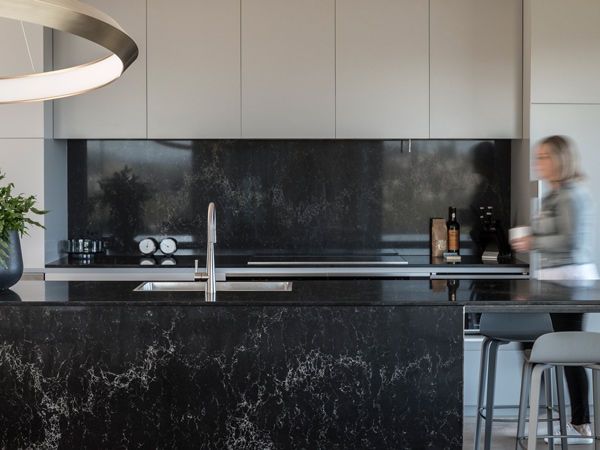
Cook with a view in Dovecote’s marble kitchen. (Image: Tim Bean)
Those who do want to explore the local area are in good hands as manager and host Kathryn Durham (known as Katie to returning guests) says there’s a lot to do right on the doorstep of Dovecote. Although she sends guests off to enjoy “horse riding, fishing, surfing, picnics, bushwalks, and great dining-out options in Gerringong, Kiama and Berry” she advises them not to book too much off site. The reason is simple: “We go above and beyond to make them feel spoilt.”
The seventies was the era that gave us shagpile carpets and shag haircuts, ponchos and Pink Floyd. It also gifted us the roadside motel. And while some of the trends from that decade have been rightfully relegated to the scrapheap, others, like this stylised form of accommodation, have come roaring back in all their retro glory. Hillcrest Merimbula, which was completed in 1969, weaves the best of the ’60s and ’70s through the bones of the mid-century building and lets the era shine on. And that was owner Caspar Tresidder’s intent. In fact, Caspar’s brief to Sydney-based interior designer Félicie Chardon, of Atelier Chardon Architecture, was for the two-storey motel, which is located at the top of Merimbula Drive facing seaward, to have the feel of lighthouse.
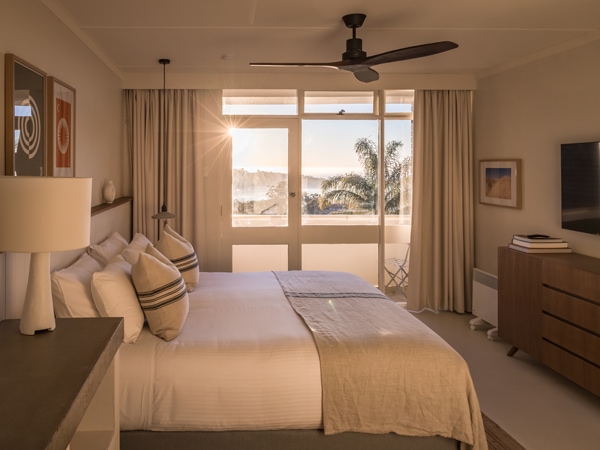
The sunny bedrooms of Hillcrest. (Image: David Rogers)
By reconfiguring all the rooms to face the view, the Hillcrest takes advantage of its lofty position; I felt like an actual lighthouse keeper while standing on my balcony looking out past Short Point, over Lake Merimbula and onto Bar Beach. Luckily, I didn’t have to guide any ships to shore. The bedside tables in my Exhale rooms contained binoculars (not a bible) and I even managed to zoom in on the whales passing by, which added to the romance of my stay.
What I loved about the Hillcrest Merimbula – apart from its no-plastics policy – is that it kept the right quotient of kitsch, taking its cues from the period and softening the once brown-brick facade with soothing earthy tones, delicate linens, concrete tables and feature mirrors. There are also design flourishes that are like a wink back to the ’70s, such as the Aztec archways and original wood panelling and pops of muted pinks and reds inspired by the sandstone and mudstone on Merimbula Beach. The motel, once shabby, is now chic. And even the act of pulling up outside the door of my room in the Merimbula motel left me with a sentimental affection for the roadside lodgings of my childhood.
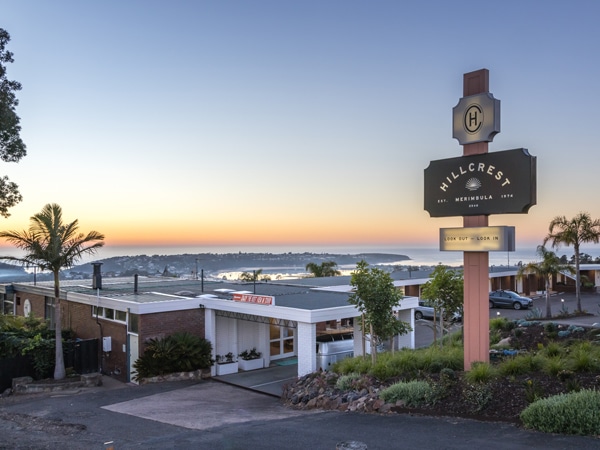
Hillcrest motel at sunset. (Image: David Rogers)
Determined to make the most of a stay, I spent a transcendent few hours sitting on my balcony, sipping a cup of Mayde Tea and breathing in the salty air. All up, there’s one family room and six inter-connecting rooms at the motel, which has 29 rooms and one one-bedroom apartment and has plans to open a casual restaurant and pool bar in November 2021. In Merimbula, outdoor adventure reigns. And while I was too busy visiting an actual lighthouse to use the tennis court, fire pit, or pool bar, I made a mental note to return with my husband and two sons who would totally approve of the motel and the fact many of Merimbula’s top surf spots are mere minutes away. – Carla Grossetti
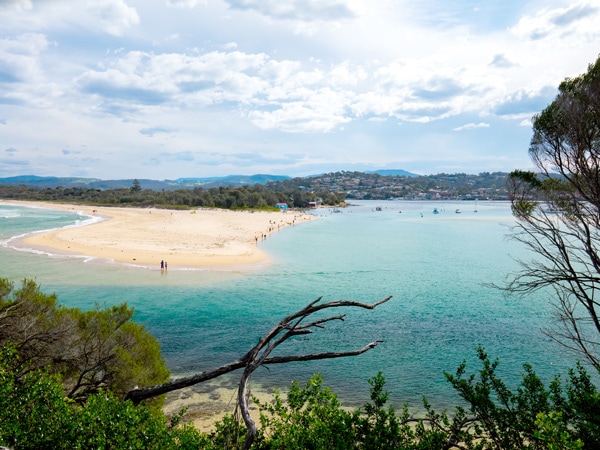
The gorgeous Merimbula coast.
The popularity of glamping continues to grow as holidaymakers trade up from traditional camping thanks to the allure of triple-digit thread counts, coffee makers and outdoor hot tubs. But the inclusions at the glamping tents at Port Stephens Koala Sanctuary are completely extra: koalas! The working wildlife sanctuary, located in bushland on the edge of One Mile Beach and Worimi Conservation Lands’ sand dunes on the NSW North Coast, is home to a fully equipped animal hospital, a collection of impossibly cute marsupials and now a clutch of generously appointed four-star canvas safari tents. Check in takes place at the reception/front office, and then it’s a short stroll (or a quick golf cart trip) to my Deluxe Glamping tent.
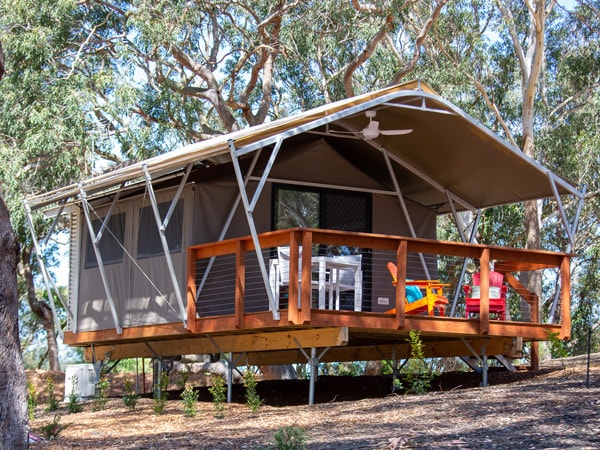
Glamp with Australian wildlife at Port Stephens. (Image: Brent Mail)
The wide covered deck looks out towards the Newcastle Airport SKYwalk and viewing platform (more on that later), while inside the layout is generous and well appointed: king bed, en suite bathroom, Smart TV and a kitchenette with inclusive snacks, drinks and the fixings for breakfast. As the day draws to a close, silence descends and the darkness is absolute. Cosied up in bed I listen out for the koala chatter one of the staff said I might hear during the night, but sleep takes over.
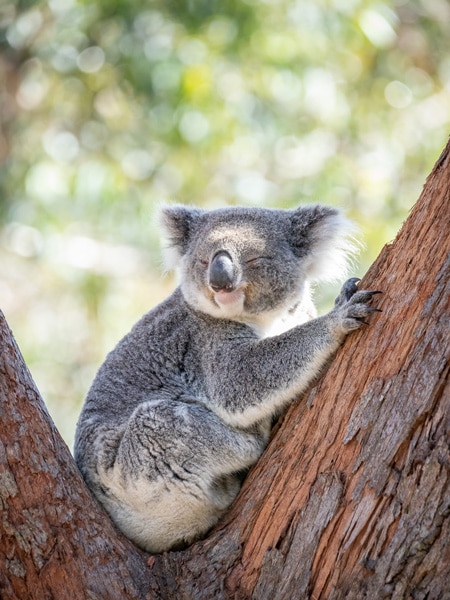
Meet a koala at Port Stephens Koala Sanctuary. (Image: Brent Mail)
I wake early for the real drawcard of glamping here: exclusive access to the early morning breakfast rituals of the resident koalas, who are too sick or injured to be returned to the wild. It’s only a short stroll to the SKYwalk, a 225-metre elevated pathway, to watch along with my guide as each of the resident koalas receive their breakfast (leaves are brought in from the areas the koalas previously inhabited) and medical treatments from a band of dedicated volunteers and staff. I linger on the treetops viewing platform before heading back to my tent for breakfast. Reluctant to leave the memory of my fluffy neighbours behind, I do indeed exit through the gift store (in this case the Fat Possum Cafe) to take home a cuddly (stuffed) koala of my own. – Leigh-Ann Pow
*Australian Traveller is the proud sponsor of two of the Koala Sanctuary’s residents, Clarence and SES Maree; see how you can help at portstephenskoalas.com.au
Drive into the hills of the Byron Hinterland, along country roads sprinkled with seasonal fruit stalls, and wonder for a moment where exactly you’re going. Then pull up to the old Eltham Hotel, elegant with its Queenslander facade. “You’ve already taken a breath of fresh air and then by the time you get there, you’re greeted with great music, a big smile and a cold drink,” says Julia Ashwood. You’ve arrived.
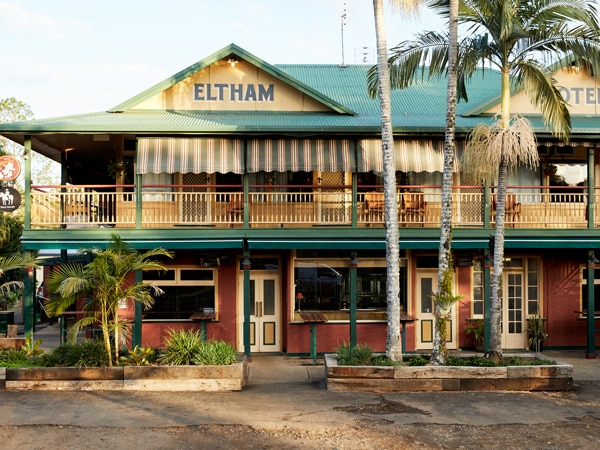
Stay at the Northern Rivers iconic Eltham Hotel. (Image: Jessie Prince)
Two years ago, Julia, founder of The Vista, bought this historic pub with husband Matt Rabbidge and business partner Luke Sullivan. It was built in 1902, when the tiny town of Eltham was a thriving railway village, and has been a community hub ever since. The trio’s approach to its restoration was “consciously gentle”, says Julia. “We never wanted to change it by any means. It’s beautiful as it is.” But they’ve imbued it with a creative spirit that permeates everything from a roster of live music, teamed with the spontaneous energy of the Eltham House Band, to a menu that supports local by chef Tim Goegan (ex Supernormal). Serving classic with a twist, you’ll find foodie numbers like burrata with freshly baked focaccia and staples like schnitzel and steak, plus great vegan and kids’ options, rounded off by an impressive wine list.
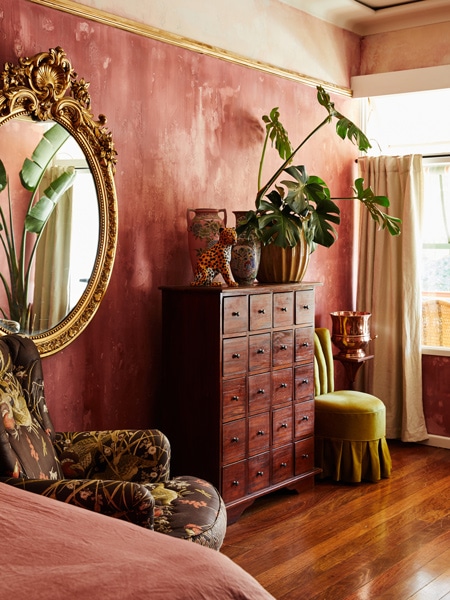
Beautiful details at the Eltham Hotel. (Image: Jessie Prince)
The cherries on top of the experience are the five bedrooms upstairs, which Julia has transformed into boutique accommodation with bags of originality. Looking for a refreshing but interesting way to refurbish the rooms, an idea crystallised after talking to the regulars and hearing the same tales of local women crop up again and again. “So then these five stories developed with these five great, albeit quite kooky, women,” says Julia. “Overnight, I knew exactly what I was doing in each room and exactly what sort of colours they needed for their walls. What rug they’d have on the floor, what lighting they’d appreciate, what music they listened to.” After a “Marketplace, Gumtree and car boot sale siege”, it all came together with a little bit of alchemy: five distinct bedrooms all rendered with their own personalities.
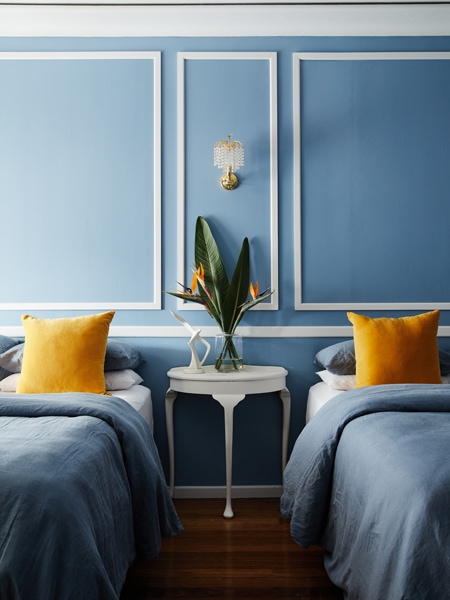
Stay near the Byron Hinterlands at Eltham Hotel. (Image: Jessie Prince)
There’s the Margaret, for the former station master at Eltham: all colours of the Australian earth and hints at tobacco, leather and steel. The Rhonda, decadent in shades of port wine magnolia, is dedicated to a sex worker who lived at the Eltham in the ’70s. Cool, classy and a little Art Deco, The Delilah is an ode to a showgirl from Lismore while the botanical-inspired Estelle is a nod to Matt’s mother, an avid gardener. The pretty Patsy, its walls a soft pink blush decorated with a rose and bird mural, is for Julia’s own mum: a local Lismore girl. “Through the years and years before me, my family used to [go to the Eltham]. And she tells me stories of what used to go on there.” The result is something that’s completely of its place and community. “There’s so much beauty in history,” says Julia. “What I was trying to do is just dive deeper into that and bring out the stories.”
From the iconic harbour to alternative inner-city neighbourhoods, Sydney is a city of many faces. And for me, one of its best angles is the tranquil, bush-fringed waterway of Pittwater. Somewhere like Great Mackerel Beach, a stone’s throw from glamorous Palm Beach but another world entirely. This peaceful hamlet is accessible only via a bushwalk through Ku-ring-Gai Chase National Park or a ferry ride across from Palm Beach: a crescent moon of sand dotted with holiday homes made for the laziest of days, and a superstar Airbnb among its ranks called The Little Black Shack.
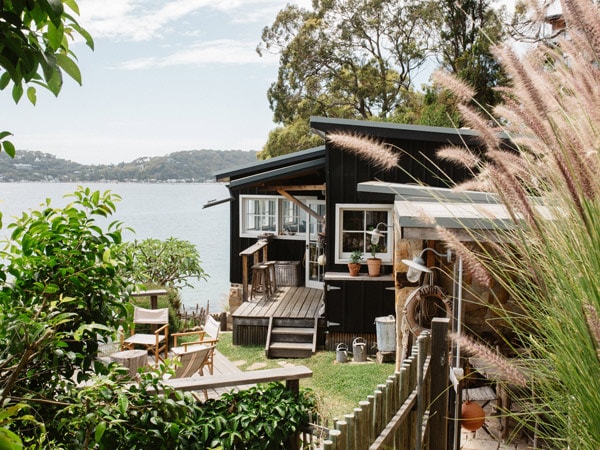
The Little Black Shack exterior. (Image: Luisa Brimble)
This old shack hand-built by fishermen around the 1930s has been fashioned into a stylish eco retreat that exudes character and authenticity. It has tales to tell and a commitment to sustainability that starts with recycled building materials and plenty of upcycling. The shack is full to the brim with an eclectic mix of pre-loved furniture, collectables and objects gathered from its owners’ travels and beach forages. Even the timber that makes up the base of the main bedroom’s comfortable king bed, lined with organic linens, had a previous life as a ramp to transport materials from the beach to the site. Everything here tells a story and it all amounts to a unique experience. And with so much thought stitched into every seam, all that’s left for you to do is feel inspired to enjoy life’s simple pleasures: from full moons and sunrises to open fires to reading books in a hammock and beachcombing for your own treasures. -Imogen Eveson
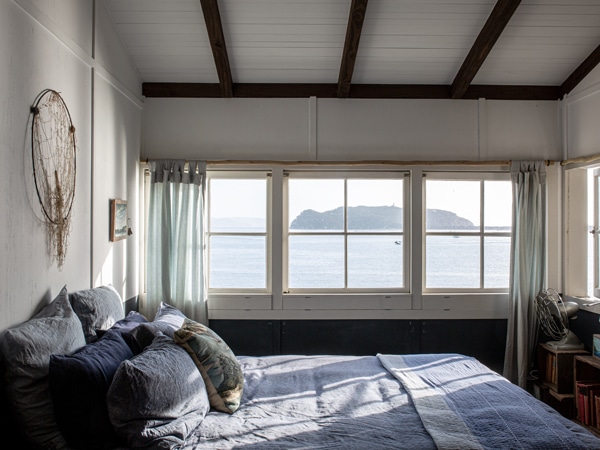
You can’t escape ocean views at The Little Black Shack. (Image: Luisa Brimble)
The sun starts to slip lower in the sky as we sit beside the light-dappled dam on Glenayr Farm attempting to absorb the last of its warmth for the day. My partner and I are making our way through a guided wine tasting of some of Mudgee’s finest when two curious kangaroos appear on the other side of the dam. Stephanie Ross, owner of Exclusively Mudgee, pauses our tasting as we watch the pair cautiously nibble away at the long strands of straw-coloured grass that frame the dam. It isn’t long before our marsupial guests lose interest and bound off beyond our view. It’s a memorable introduction to our first night glamping on the 130-hectare working sheep farm.
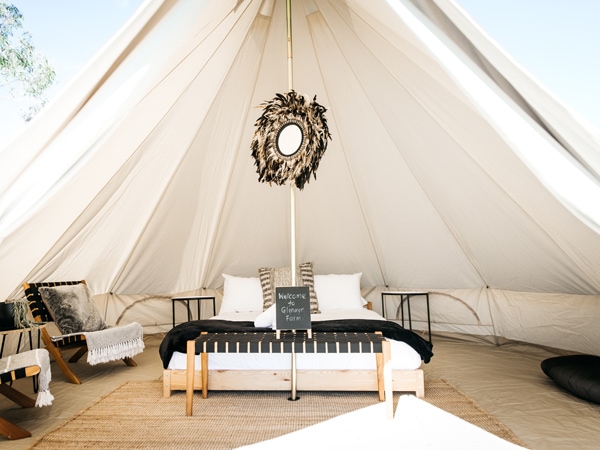
Glenayr offers a luxurious stay amongst untouched nature. (Image: Lean Timms)
This sprawling parcel of land is set in blissful seclusion, completely off-grid and solar-powered; I lost my wi-fi signal the moment we took the first bend in the winding, unsealed road up to the glampsite. But for all its seemingly rugged isolation, Glenayr is only a 25 minute drive from Mudgee and the world-renowned wineries that surround it. I can see our bell tent, Pinot, from the dam, one of four pitched on the side of the hill now bathed in the soft glow of a pastel-pink sunset. (Two off-grid villas have been added since my stay.) Each tent is spaced 15 metres apart for privacy, but close to the communal quarters that house two bathrooms with hot showers, a kitchen and lounge room with indoor fireplace, television, a billiards table and plenty of games, DVDs and books for entertainment. Not that you need it.
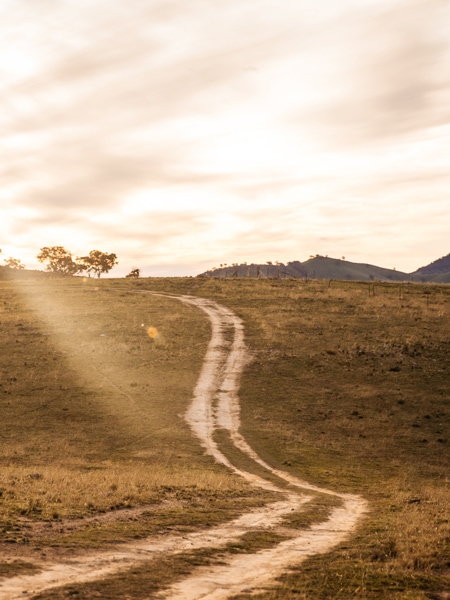
Glenayr’s country landscape. (Image: Lean Timms)
The beauty of this place is found in the simple pleasure of doing nothing at all. We’ve pre-booked the wood-fired hot tub for the night and hurry to collect kindling and logs from the shed to heat the water before we lose the last light of day. It’s not long before darkness falls and we’re treated to a nature show of a different kind as the stars come out to shine. We slip into the tub and take in the sights. Smoke billows from the pipe above, I hear the fire pit crackling below and feel the peacefulness of the moment seep into my bones. Soon a steak will be sizzling on the barbecue for dinner and we’ll gather around the fire to let the heat fight the coolness in the crisp, country air before retreating to our cosy queen-size bed for the night. -Katie Carlin
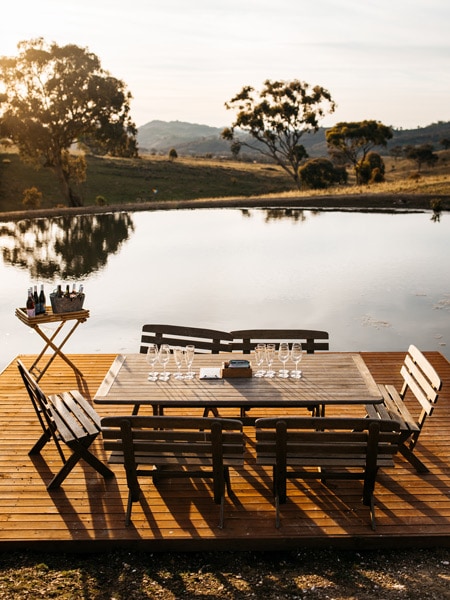
Enjoy a drink with a view. (Image: Lean Timms)
With the recent arrival of Crystalbrook Kingsley, Newcastle finally has a hotel to match its second-city status. Part of the Crystalbrook roster, which prides itself on producing hotels of equal standard but possessed of their own distinctive personalities, Kingsley is positioned at the epicentre of the city’s cultural precinct, and has added to the offering with its vibrant Roundhouse rooftop restaurant and Romberg’s cocktail bar.
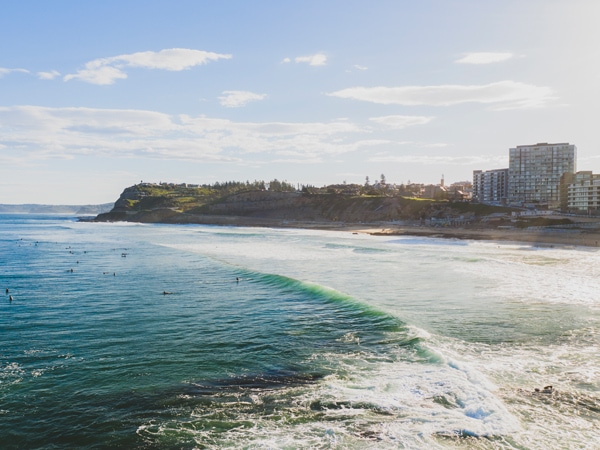
Kingsley is positioned at the epicentre of Newcastle’s cultural precinct. (Image: Destination NSW)
While each of its hotels has a signature colour – Kingsley’s is yellow, which is leaned on heavily throughout the design-savvy interiors – they are also linked by an exacting commitment to sustainable practices, something the brand calls Sustainable Luxury. Initiatives include no-waste bathrooms, composting, sourcing fruit and vegetable within three hours’ drive of its hotels, working with OzHarvest to redistribute unused food, rewards for guests electing to not have rooms serviced daily, eco and sustainable uniforms for staff, and the list goes on and on. Even the Crystalbrook Kingsley building is recycled: the hotel is housed in the Brutalist edifice of the city’s former City Administration Centre’s Roundhouse building.
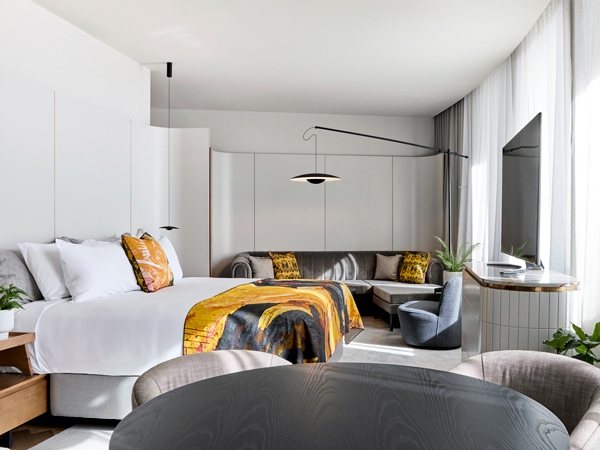
Kingsley’s signature colour is yellow, which is leaned on heavily throughout the design-savvy interiors.
Read all 100 unique stays around Australia here.
For the  best travel inspiration delivered straight to your door.
best travel inspiration delivered straight to your door.
LEAVE YOUR COMMENT